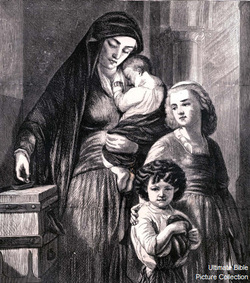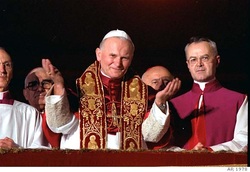
November 11th, 2012
32nd Sunday in Ordinary Time
Veteran’s Day
Today we honor our military veterans who have defended our homeland’s sovereign freedom. An army protects her nation’s freedom from external tyranny. Political leaders protect a nation from internal tyranny. Today’s opening prayer reminds us that freedom is essentially the pursuit of God’s will: “Almighty and merciful God, … unhindered in mind and body alike, may we pursue in freedom of heart the things that are yours.” Freedom is the capacity to attain the “things that are Gods”—life, liberty, and the pursuit of happiness. Last week’s election focused on the things that are man’s (mostly the economy) and not the things that are God’s (respect for human life and freedom of religion, for example). Some of the leaders we elected, sadly, disregard human life, and so violate human liberty. It is an unhappy and tyrannous state that strips God’s natural law from the public square. We honor our veterans best by defending America from internal threats to her freedom, as they defend her from external tyrannies.
Tithing
In the Gospel today, Jesus praises the indigent widow for giving her mite to the temple treasury. Tithing—giving ten percent of one’s increase—was obligatory for Jews in Christ’s time, but the widow gave not 10% but 100%. “She, from her poverty, has contributed all she had, her whole livelihood.” The Church does not specify the Biblical ten percent, but the fifth Precept of the Church, as defined in Canon 222, states: “The Christian faithful are obliged to assist with the needs of the Church, so that the Church has what is necessary for divine worship, for apostolic works and words of charity.” The essential purpose of charitable giving, however, is not to fund a need; it is simply to give. The poor widow’s mite certainly did not fund much of the Temple’s expenses, and yet Jesus said that she had given more than the wealthiest benefactors. We don’t give to a need; we have a need to give. Sacrificial giving is absolutely essential for our sanctification, as an act of surrender to God’s providence. In giving from our substance, we proclaim God sovereign Lord and possessor of all we have. Consecrated religious make an absolute vow of poverty. Those of us in the world give a sacrificial percentage of our wealth as a sign of our absolute trust in God’s providence.
As a layman, I gave a portion of my income to the Church, but as a priest I figured I was exempt. Then I heard someone give a convicting talk on sacrificial giving. I decided to start giving 10% off the top, but the timing was bad—always is. I had just bought my first new car (I still have it today—runs like a top). It took me three years to save $17,000, but the car ended up costing $27,000. So I borrowed $10,000 from a friend and told him it would take two years to pay it back. Just after I started tithing to my parish, a series of strange windfalls came to me over the next two months—someone paid me back for a loan, I got a hefty tax rebate, the Bishop reimbursed me for expenses over some years without my asking, etc. In two months I was able to pay $10,000 back, even while tithing, whereas before tithing it took me almost two years to save that amount. Wow, I thought to myself. It really works! Actually, it doesn't always work like that. Little miracles like that happen just enough to open our eyes to God’s providence.
Stewardship
Money is important, but certainly not the most important, of God’s gifts. Faith, hope, and love, for example; our time, health and energy, personal talents, and friendships— these gifts are much more precious than financial wealth. And God asks us to return a portion of these gifts as well. It’s what Blessed John Paul II called the Law of the Gift: that we receive to the extent that we freely give. In St. Francis’ words, “it is in giving that we receive,” and in Fr. Robert Barron’s words, “abundance comes through the willing gift.” If you want more faith, give faith. Share it with others, and your faith will grow. If you want more joy, smile at others, share your joy, and God will fill you with true joy.
In fact, everything we have is God’s anyway, and sharing some of what we have convicts us of this truth. It detaches us from things so we can fulfill the two great commandments of last week’s gospel: to love God and neighbor. Returning a portion of our gifts is called stewardship. We are stewards, not owners, of everything we have. Giving part of it back to God convinces us of this over time. We learn to trust Him.

But we are afraid to give—to give even the token 10%, let alone the 100% that we ultimately must give. God, and the man of God Elijah, urges us to be not afraid. In the first reading, the Prophet asks a poor widow for a bite to eat. She says that her son and she have only a morsel left, and then they will starve. Elijah then says to the widow: “Be not afraid.” Give it all to God, and you will see what wonders he will do for you. “And the jar of flour did not go empty, nor the cruse of oil run dry,” for the mother and son until the drought ended.
“Do not be afraid.” Do not be afraid to give what God asks, and to smile as we give it. John Paul II thundered these words in his first papal homily, given at St. Peter’s, October 22, 1978. I watched it on YouTube last night. Let me translate it for you:
Non abbiate paura! Aprite, anzi, spalancate le porte a Cristo!
Do not be afraid! Open, even fling wide, the doors to Christ!
Alla sua salvatrice potestà aprite i confini degli Stati, i sistemi economici come quelli politici, i vasti campi di cultura, di civiltà, di sviluppo.
Open to his saving power national borders, economic and political systems, the vast fields of culture, of society, of development.
Non abbiate paura! Cristo sa “cosa è dentro l’uomo”. Solo lui lo sa!
Be not afraid! Christ knows what is in the heart of man. He alone knows!
Pope John Paul spoke these words as the borders of his homeland were closed to Christ. Perceptive people see our own national borders—our fields of culture, our political and economic systems—closing their doors to Christ. In this year of faith, we must not be afraid to give everything we have—not just 10% of our time, our abilities, our money—to the work of the Gospel.
Most of you are college students. You labor long hours to learn the eternal truths and principles undergirding western civilization. You will need these first principles to defend, recover, and preserve America’s basic freedoms. As our military veterans fought tyranny from without, you must fight tyranny from within. Many will become teachers, and businessmen, and political leaders. You must wage these battles in the fields of economic development, political leadership, higher education, and in the vast fields of culture and society. Do not be afraid to trust God as the poor widows of our Scriptures today. Do not be afraid to witness to God’s truth as did Blessed John Paul II. May God, and Our Lady, strengthen you in waging the battles for culture that are certain to require your service.


 RSS Feed
RSS Feed